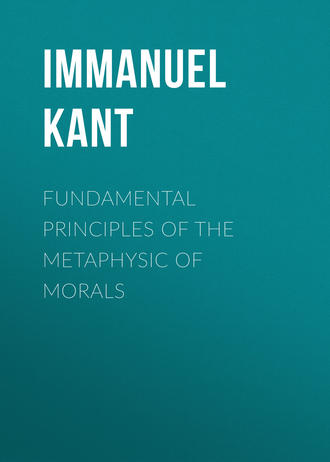 полная версия
полная версияFundamental Principles of the Metaphysic of Morals
To secure one's own happiness is a duty, at least indirectly; for discontent with one's condition, under a pressure of many anxieties and amidst unsatisfied wants, might easily become a great temptation to transgression of duty. But here again, without looking to duty, all men have already the strongest and most intimate inclination to happiness, because it is just in this idea that all inclinations are combined in one total. But the precept of happiness is often of such a sort that it greatly interferes with some inclinations, and yet a man cannot form any definite and certain conception of the sum of satisfaction of all of them which is called happiness. It is not then to be wondered at that a single inclination, definite both as to what it promises and as to the time within which it can be gratified, is often able to overcome such a fluctuating idea, and that a gouty patient, for instance, can choose to enjoy what he likes, and to suffer what he may, since, according to his calculation, on this occasion at least, he has not sacrificed the enjoyment of the present moment to a possibly mistaken expectation of a happiness which is supposed to be found in health. But even in this case, if the general desire for happiness did not influence his will, and supposing that in his particular case health was not a necessary element in this calculation, there yet remains in this, as in all other cases, this law, namely, that he should promote his happiness not from inclination but from duty, and by this would his conduct first acquire true moral worth.
It is in this manner, undoubtedly, that we are to understand those passages of Scripture also in which we are commanded to love our neighbour, even our enemy. For love, as an affection, cannot be commanded, but beneficence for duty's sake may; even though we are not impelled to it by any inclination- nay, are even repelled by a natural and unconquerable aversion. This is practical love and not pathological- a love which is seated in the will, and not in the propensions of sense- in principles of action and not of tender sympathy; and it is this love alone which can be commanded.
The second proposition is: That an action done from duty derives its moral worth, not from the purpose which is to be attained by it, but from the maxim by which it is determined, and therefore does not depend on the realization of the object of the action, but merely on the principle of volition by which the action has taken place, without regard to any object of desire. It is clear from what precedes that the purposes which we may have in view in our actions, or their effects regarded as ends and springs of the will, cannot give to actions any unconditional or moral worth. In what, then, can their worth lie, if it is not to consist in the will and in reference to its expected effect? It cannot lie anywhere but in the principle of the will without regard to the ends which can be attained by the action. For the will stands between its a priori principle, which is formal, and its a posteriori spring, which is material, as between two roads, and as it must be determined by something, it follows that it must be determined by the formal principle of volition when an action is done from duty, in which case every material principle has been withdrawn from it.
The third proposition, which is a consequence of the two preceding, I would express thus: Duty is the necessity of acting from respect for the law. I may have inclination for an object as the effect of my proposed action, but I cannot have respect for it, just for this reason, that it is an effect and not an energy of will. Similarly I cannot have respect for inclination, whether my own or another's; I can at most, if my own, approve it; if another's, sometimes even love it; i.e., look on it as favourable to my own interest. It is only what is connected with my will as a principle, by no means as an effect- what does not subserve my inclination, but overpowers it, or at least in case of choice excludes it from its calculation- in other words, simply the law of itself, which can be an object of respect, and hence a command. Now an action done from duty must wholly exclude the influence of inclination and with it every object of the will, so that nothing remains which can determine the will except objectively the law, and subjectively pure respect for this practical law, and consequently the maxim 1 that I should follow this law even to the thwarting of all my inclinations.
Thus the moral worth of an action does not lie in the effect expected from it, nor in any principle of action which requires to borrow its motive from this expected effect. For all these effects- agreeableness of one's condition and even the promotion of the happiness of others- could have been also brought about by other causes, so that for this there would have been no need of the will of a rational being; whereas it is in this alone that the supreme and unconditional good can be found. The pre-eminent good which we call moral can therefore consist in nothing else than the conception of law in itself, which certainly is only possible in a rational being, in so far as this conception, and not the expected effect, determines the will. This is a good which is already present in the person who acts accordingly, and we have not to wait for it to appear first in the result. 2
But what sort of law can that be, the conception of which must determine the will, even without paying any regard to the effect expected from it, in order that this will may be called good absolutely and without qualification? As I have deprived the will of every impulse which could arise to it from obedience to any law, there remains nothing but the universal conformity of its actions to law in general, which alone is to serve the will as a principle, i.e., I am never to act otherwise than so that I could also will that my maxim should become a universal law. Here, now, it is the simple conformity to law in general, without assuming any particular law applicable to certain actions, that serves the will as its principle and must so serve it, if duty is not to be a vain delusion and a chimerical notion. The common reason of men in its practical judgements perfectly coincides with this and always has in view the principle here suggested. Let the question be, for example: May I when in distress make a promise with the intention not to keep it? I readily distinguish here between the two significations which the question may have: Whether it is prudent, or whether it is right, to make a false promise? The former may undoubtedly often be the case. I see clearly indeed that it is not enough to extricate myself from a present difficulty by means of this subterfuge, but it must be well considered whether there may not hereafter spring from this lie much greater inconvenience than that from which I now free myself, and as, with all my supposed cunning, the consequences cannot be so easily foreseen but that credit once lost may be much more injurious to me than any mischief which I seek to avoid at present, it should be considered whether it would not be more prudent to act herein according to a universal maxim and to make it a habit to promise nothing except with the intention of keeping it. But it is soon clear to me that such a maxim will still only be based on the fear of consequences. Now it is a wholly different thing to be truthful from duty and to be so from apprehension of injurious consequences. In the first case, the very notion of the action already implies a law for me; in the second case, I must first look about elsewhere to see what results may be combined with it which would affect myself. For to deviate from the principle of duty is beyond all doubt wicked; but to be unfaithful to my maxim of prudence may often be very advantageous to me, although to abide by it is certainly safer. The shortest way, however, and an unerring one, to discover the answer to this question whether a lying promise is consistent with duty, is to ask myself, "Should I be content that my maxim (to extricate myself from difficulty by a false promise) should hold good as a universal law, for myself as well as for others?" and should I be able to say to myself, "Every one may make a deceitful promise when he finds himself in a difficulty from which he cannot otherwise extricate himself?" Then I presently become aware that while I can will the lie, I can by no means will that lying should be a universal law. For with such a law there would be no promises at all, since it would be in vain to allege my intention in regard to my future actions to those who would not believe this allegation, or if they over hastily did so would pay me back in my own coin. Hence my maxim, as soon as it should be made a universal law, would necessarily destroy itself.
I do not, therefore, need any far-reaching penetration to discern what I have to do in order that my will may be morally good. Inexperienced in the course of the world, incapable of being prepared for all its contingencies, I only ask myself: Canst thou also will that thy maxim should be a universal law? If not, then it must be rejected, and that not because of a disadvantage accruing from it to myself or even to others, but because it cannot enter as a principle into a possible universal legislation, and reason extorts from me immediate respect for such legislation. I do not indeed as yet discern on what this respect is based (this the philosopher may inquire), but at least I understand this, that it is an estimation of the worth which far outweighs all worth of what is recommended by inclination, and that the necessity of acting from pure respect for the practical law is what constitutes duty, to which every other motive must give place, because it is the condition of a will being good in itself, and the worth of such a will is above everything.
Thus, then, without quitting the moral knowledge of common human reason, we have arrived at its principle. And although, no doubt, common men do not conceive it in such an abstract and universal form, yet they always have it really before their eyes and use it as the standard of their decision. Here it would be easy to show how, with this compass in hand, men are well able to distinguish, in every case that occurs, what is good, what bad, conformably to duty or inconsistent with it, if, without in the least teaching them anything new, we only, like Socrates, direct their attention to the principle they themselves employ; and that, therefore, we do not need science and philosophy to know what we should do to be honest and good, yea, even wise and virtuous. Indeed we might well have conjectured beforehand that the knowledge of what every man is bound to do, and therefore also to know, would be within the reach of every man, even the commonest. Here we cannot forbear admiration when we see how great an advantage the practical judgement has over the theoretical in the common understanding of men. In the latter, if common reason ventures to depart from the laws of experience and from the perceptions of the senses, it falls into mere inconceivabilities and self-contradictions, at least into a chaos of uncertainty, obscurity, and instability. But in the practical sphere it is just when the common understanding excludes all sensible springs from practical laws that its power of judgement begins to show itself to advantage. It then becomes even subtle, whether it be that it chicanes with its own conscience or with other claims respecting what is to be called right, or whether it desires for its own instruction to determine honestly the worth of actions; and, in the latter case, it may even have as good a hope of hitting the mark as any philosopher whatever can promise himself. Nay, it is almost more sure of doing so, because the philosopher cannot have any other principle, while he may easily perplex his judgement by a multitude of considerations foreign to the matter, and so turn aside from the right way. Would it not therefore be wiser in moral concerns to acquiesce in the judgement of common reason, or at most only to call in philosophy for the purpose of rendering the system of morals more complete and intelligible, and its rules more convenient for use (especially for disputation), but not so as to draw off the common understanding from its happy simplicity, or to bring it by means of philosophy into a new path of inquiry and instruction?
Innocence is indeed a glorious thing; only, on the other hand, it is very sad that it cannot well maintain itself and is easily seduced. On this account even wisdom- which otherwise consists more in conduct than in knowledge- yet has need of science, not in order to learn from it, but to secure for its precepts admission and permanence. Against all the commands of duty which reason represents to man as so deserving of respect, he feels in himself a powerful counterpoise in his wants and inclinations, the entire satisfaction of which he sums up under the name of happiness. Now reason issues its commands unyieldingly, without promising anything to the inclinations, and, as it were, with disregard and contempt for these claims, which are so impetuous, and at the same time so plausible, and which will not allow themselves to be suppressed by any command. Hence there arises a natural dialectic, i.e., a disposition, to argue against these strict laws of duty and to question their validity, or at least their purity and strictness; and, if possible, to make them more accordant with our wishes and inclinations, that is to say, to corrupt them at their very source, and entirely to destroy their worth- a thing which even common practical reason cannot ultimately call good.
Thus is the common reason of man compelled to go out of its sphere, and to take a step into the field of a practical philosophy, not to satisfy any speculative want (which never occurs to it as long as it is content to be mere sound reason), but even on practical grounds, in order to attain in it information and clear instruction respecting the source of its principle, and the correct determination of it in opposition to the maxims which are based on wants and inclinations, so that it may escape from the perplexity of opposite claims and not run the risk of losing all genuine moral principles through the equivocation into which it easily falls. Thus, when practical reason cultivates itself, there insensibly arises in it a dialetic which forces it to seek aid in philosophy, just as happens to it in its theoretic use; and in this case, therefore, as well as in the other, it will find rest nowhere but in a thorough critical examination of our reason.
SEC_2
SECOND SECTION
TRANSITION FROM POPULAR MORAL PHILOSOPHY TO THE METAPHYSIC OF MORALS
If we have hitherto drawn our notion of duty from the common use of our practical reason, it is by no means to be inferred that we have treated it as an empirical notion. On the contrary, if we attend to the experience of men's conduct, we meet frequent and, as we ourselves allow, just complaints that one cannot find a single certain example of the disposition to act from pure duty. Although many things are done in conformity with what duty prescribes, it is nevertheless always doubtful whether they are done strictly from duty, so as to have a moral worth. Hence there have at all times been philosophers who have altogether denied that this disposition actually exists at all in human actions, and have ascribed everything to a more or less refined self-love. Not that they have on that account questioned the soundness of the conception of morality; on the contrary, they spoke with sincere regret of the frailty and corruption of human nature, which, though noble enough to take its rule an idea so worthy of respect, is yet weak to follow it and employs reason which ought to give it the law only for the purpose of providing for the interest of the inclinations, whether singly or at the best in the greatest possible harmony with one another.
In fact, it is absolutely impossible to make out by experience with complete certainty a single case in which the maxim of an action, however right in itself, rested simply on moral grounds and on the conception of duty. Sometimes it happens that with the sharpest self-examination we can find nothing beside the moral principle of duty which could have been powerful enough to move us to this or that action and to so great a sacrifice; yet we cannot from this infer with certainty that it was not really some secret impulse of self-love, under the false appearance of duty, that was the actual determining cause of the will. We like them to flatter ourselves by falsely taking credit for a more noble motive; whereas in fact we can never, even by the strictest examination, get completely behind the secret springs of action; since, when the question is of moral worth, it is not with the actions which we see that we are concerned, but with those inward principles of them which we do not see.
Moreover, we cannot better serve the wishes of those who ridicule all morality as a mere chimera of human imagination over stepping itself from vanity, than by conceding to them that notions of duty must be drawn only from experience (as from indolence, people are ready to think is also the case with all other notions); for or is to prepare for them a certain triumph. I am willing to admit out of love of humanity that even most of our actions are correct, but if we look closer at them we everywhere come upon the dear self which is always prominent, and it is this they have in view and not the strict command of duty which would often require self-denial. Without being an enemy of virtue, a cool observer, one that does not mistake the wish for good, however lively, for its reality, may sometimes doubt whether true virtue is actually found anywhere in the world, and this especially as years increase and the judgement is partly made wiser by experience and partly, also, more acute in observation. This being so, nothing can secure us from falling away altogether from our ideas of duty, or maintain in the soul a well-grounded respect for its law, but the clear conviction that although there should never have been actions which really sprang from such pure sources, yet whether this or that takes place is not at all the question; but that reason of itself, independent on all experience, ordains what ought to take place, that accordingly actions of which perhaps the world has hitherto never given an example, the feasibility even of which might be very much doubted by one who founds everything on experience, are nevertheless inflexibly commanded by reason; that, e.g., even though there might never yet have been a sincere friend, yet not a whit the less is pure sincerity in friendship required of every man, because, prior to all experience, this duty is involved as duty in the idea of a reason determining the will by a priori principles.
When we add further that, unless we deny that the notion of morality has any truth or reference to any possible object, we must admit that its law must be valid, not merely for men but for all rational creatures generally, not merely under certain contingent conditions or with exceptions but with absolute necessity, then it is clear that no experience could enable us to infer even the possibility of such apodeictic laws. For with what right could we bring into unbounded respect as a universal precept for every rational nature that which perhaps holds only under the contingent conditions of humanity? Or how could laws of the determination of our will be regarded as laws of the determination of the will of rational beings generally, and for us only as such, if they were merely empirical and did not take their origin wholly a priori from pure but practical reason?
Nor could anything be more fatal to morality than that we should wish to derive it from examples. For every example of it that is set before me must be first itself tested by principles of morality, whether it is worthy to serve as an original example, i.e., as a pattern; but by no means can it authoritatively furnish the conception of morality. Even the Holy One of the Gospels must first be compared with our ideal of moral perfection before we can recognise Him as such; and so He says of Himself, "Why call ye Me (whom you see) good; none is good (the model of good) but God only (whom ye do not see)?" But whence have we the conception of God as the supreme good? Simply from the idea of moral perfection, which reason frames a priori and connects inseparably with the notion of a free will. Imitation finds no place at all in morality, and examples serve only for encouragement, i.e., they put beyond doubt the feasibility of what the law commands, they make visible that which the practical rule expresses more generally, but they can never authorize us to set aside the true original which lies in reason and to guide ourselves by examples.
If then there is no genuine supreme principle of morality but what must rest simply on pure reason, independent of all experience, I think it is not necessary even to put the question whether it is good to exhibit these concepts in their generality (in abstracto) as they are established a priori along with the principles belonging to them, if our knowledge is to be distinguished from the vulgar and to be called philosophical.
In our times indeed this might perhaps be necessary; for if we collected votes whether pure rational knowledge separated from everything empirical, that is to say, metaphysic of morals, or whether popular practical philosophy is to be preferred, it is easy to guess which side would preponderate.
This descending to popular notions is certainly very commendable, if the ascent to the principles of pure reason has first taken place and been satisfactorily accomplished. This implies that we first found ethics on metaphysics, and then, when it is firmly established, procure a hearing for it by giving it a popular character. But it is quite absurd to try to be popular in the first inquiry, on which the soundness of the principles depends. It is not only that this proceeding can never lay claim to the very rare merit of a true philosophical popularity, since there is no art in being intelligible if one renounces all thoroughness of insight; but also it produces a disgusting medley of compiled observations and half-reasoned principles. Shallow pates enjoy this because it can be used for every-day chat, but the sagacious find in it only confusion, and being unsatisfied and unable to help themselves, they turn away their eyes, while philosophers, who see quite well through this delusion, are little listened to when they call men off for a time from this pretended popularity, in order that they might be rightfully popular after they have attained a definite insight.
We need only look at the attempts of moralists in that favourite fashion, and we shall find at one time the special constitution of human nature (including, however, the idea of a rational nature generally), at one time perfection, at another happiness, here moral sense, there fear of God. a little of this, and a little of that, in marvellous mixture, without its occurring to them to ask whether the principles of morality are to be sought in the knowledge of human nature at all (which we can have only from experience); or, if this is not so, if these principles are to be found altogether a priori, free from everything empirical, in pure rational concepts only and nowhere else, not even in the smallest degree; then rather to adopt the method of making this a separate inquiry, as pure practical philosophy, or (if one may use a name so decried) as metaphysic of morals, 3 to bring it by itself to completeness, and to require the public, which wishes for popular treatment, to await the issue of this undertaking.
Such a metaphysic of morals, completely isolated, not mixed with any anthropology, theology, physics, or hyperphysics, and still less with occult qualities (which we might call hypophysical), is not only an indispensable substratum of all sound theoretical knowledge of duties, but is at the same time a desideratum of the highest importance to the actual fulfilment of their precepts. For the pure conception of duty, unmixed with any foreign addition of empirical attractions, and, in a word, the conception of the moral law, exercises on the human heart, by way of reason alone (which first becomes aware with this that it can of itself be practical), an influence so much more powerful than all other springs 4 which may be derived from the field of experience, that, in the consciousness of its worth, it despises the latter, and can by degrees become their master; whereas a mixed ethics, compounded partly of motives drawn from feelings and inclinations, and partly also of conceptions of reason, must make the mind waver between motives which cannot be brought under any principle, which lead to good only by mere accident and very often also to evil.









